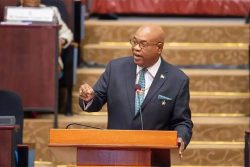KABUL, (Reuters) – A suicide bomber rammed an explosive-laden car into a NATO convoy in the Afghan capital yesterday, killing at least eight people in a wave of violence two days before an election the Taliban has vowed to disrupt.
Rockets also hit Kabul, several rural polling stations were attacked, a provincial council candidate was gunned down and three election workers were killed by a bomb in violence ahead of tomorrow’s vote.
Incumbent Hamid Karzai is seeking re-election in the second presidential ballot since the Taliban were ousted in 2001, and a credible result is vital for the country’s success in attracting investment and development aid.
Afghan officials and NATO-led forces said more than 50 people were wounded by Tuesday’s car bombing, the second massive strike of its kind in four days after months that had seen no major attacks penetrate the usually secure capital. One NATO service member and two Afghans working for the United Nations were among the dead, the rest Afghan civilians. Thick black smoke poured from the scene and police held back onlookers as the wounded were ferried away in ambulances and pickup trucks.
“I saw wounded people and dead people everywhere,” said a shopkeeper named Sawad. “I helped some people to ambulances; their clothes were covered in blood stains.”
In a statement, Karzai said such attacks would not deter Afghans, who would vote “despite the efforts of the enemies and will show their opposition to their barbaric acts”.
Officials worry Taliban threats and attacks will spoil the turnout, and yesterday the Afghan Security Council issued a statement requesting Afghan and Western media to refrain from reporting violence on election day, an edict likely to be ignored by the free-wheeling media that has emerged in recent years.
Polls show Karzai likely to win tomorrow’s vote, but suggest he could fall just short of the outright majority needed to avoid a second round run-off in October. Election campaigning officially ended at midnight after a final day of hectic rallies in support of Karzai and his main rival, former foreign minister Abdullah Abdullah.
Despite the violence, Kai Eide, the U.N. special envoy for Afghanistan, said he expected the vote would be a success.
“I’m not trying to hide that there have been irregularities, but my overall assesment is that this has been a success for the Afghan people,” he told a news conference. Abdullah, an urbane eye doctor, has run an energetic campaign, seeking to garner support from beyond his base in the mainly ethnic Tajik north. Recent polls give Karzai about 45 percent of the vote to 25 percent for Abdullah.
The president, meanwhile, has relied on endorsements from ex-militia leaders such as Uzbek General Abdul Rashid Dostum, raising alarm among international donors worried that warlords could return to power in a country they dominated for decades.








